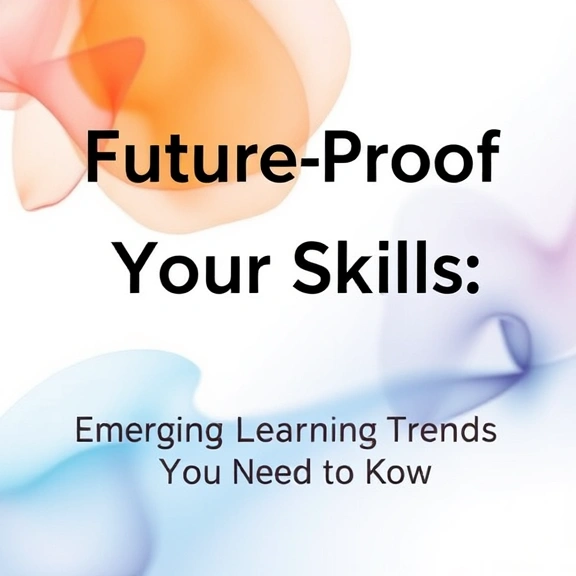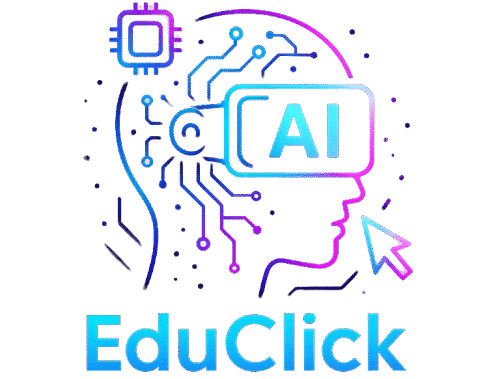Mastering the Future: Essential Learning Trends to Future-Proof Your Skills
In the fast-paced whirlwind of today’s world, the haunting question of “Am I keeping up?” can often resonate in your mind. You might find yourself gazing at a computer screen, pondering over the vast ocean of information and wondering which waves to ride. You’re not alone in this quandary; many are navigating the same stormy seas, trying to grasp which skills will anchor them in the future. Whether you’re a career starter, a seasoned professional, or someone contemplating a shift, the pressing urge to remain relevant and resilient is universal.

Imagine standing at the edge of a vast, unexplored forest. Each tree represents a new skill, a potential opportunity to grow and adapt. The forest is dense, seemingly infinite, and choosing the right path feels daunting. But as you step forward, you realize that past experiences, curiosity, and adaptability light your way. Embracing new learning trends isn’t just about survival—it’s about thriving, about carving a path that not only secures your future but also enriches it. Your journey towards future-proof skills is not just a professional endeavor; it’s a personal evolution.
Personal tales of transformation can be inspiring. Take, for instance, the story of Jane, who, after years in traditional marketing, embraced data analytics. She utilized emerging learning trends to pivot her career. Her bold step into the unknown equipped her not only with future-proof skills but also with the confidence to face the future head-on. Your story, too, can be one of triumph and growth, as long as you’re willing to plant the seeds of learning today.
Your quest to stay relevant in this dynamic landscape starts here. Dive into this guide to explore innovative teaching methods, uncover future-proof skills, and harness the power of emerging learning trends. This is your roadmap to skills development in 2023 and beyond, aimed at empowering you with knowledge and strategies that will illuminate your path to success.
1. Embracing Technology-Driven Learning
1.1 Virtual Reality and Augmented Reality
Virtual Reality (VR) and Augmented Reality (AR) are revolutionizing the educational landscape. These technologies offer immersive experiences, allowing you to engage with content in unprecedented ways. Imagine being able to walk through a historical site as part of a history lesson or dissecting a complex molecule in a virtual chemistry lab. VR and AR are not just tools; they are gateways to deeper understanding.
- Case Study: A medical student uses VR to practice surgeries, reducing real-world errors.
- Practical Application: Language learners can use AR apps to translate and understand real-world signage.
1.2 Artificial Intelligence in Learning
Artificial Intelligence (AI) is fostering personalized learning experiences. AI can assess your strengths and weaknesses, tailoring content to suit your individual needs. For example, adaptive learning platforms adjust the difficulty of lessons in real-time, ensuring you are neither overwhelmed nor under-challenged.
- Example: Duolingo uses AI to personalize language learning paths for users.
- Actionable Tip: Engage with AI-driven platforms like Coursera for tailored courses.
1.3 Gamification
Gamification infuses the fun of game elements into learning. By incorporating points, badges, and leaderboards, learning becomes an engaging, competitive, and rewarding experience. This approach not only motivates but also enhances retention.
- Case Study: Duolingo and Khan Academy use gamification to boost user engagement.
- Application: Use apps like Quizlet that employ gamified learning techniques.
2. Cultivating Soft Skills Through Innovative Methods
2.1 Emotional Intelligence Workshops
In the digital age, emotional intelligence has become as crucial as technical skills. Workshops focusing on empathy, self-awareness, and interpersonal skills are vital for personal and professional growth. These workshops teach you to navigate complex human interactions effectively.
- Example: Attend emotional intelligence seminars available through platforms like LinkedIn Learning.
- Application: Practice what you learn through real-world interactions.
2.2 Collaborative Learning Platforms
Working in teams is essential in today’s interconnected world. Platforms like Slack and Microsoft Teams provide spaces for collaboration, allowing you to build communication and teamwork skills. Collaborative learning helps you understand different perspectives and develop solutions collectively.
- Example: Participate in group projects on platforms like Trello.
- Tip: Use these platforms to engage in peer learning and feedback sessions.
2.3 Storytelling and Creativity Enhancement
Storytelling is a powerful tool for communication and creativity. Learning how to craft compelling narratives can enhance your ability to present ideas and persuade others. Workshops and courses focusing on creative writing and public speaking can significantly bolster these skills.
- Example: Enroll in storytelling workshops on Skillshare.
- Application: Practice storytelling in meetings and presentations to engage your audience.
🎥 Vídeo complementar sobre o tópico
3. Adaptation to Remote and Hybrid Learning Environments
3.1 Online Learning Platforms
Platforms such as Udemy, Coursera, and edX have democratized education, bringing world-class courses to your fingertips. By exploring these platforms, you can access a diverse range of courses that align with your career goals.
- Example: Complete a certification in data science on Coursera.
- Tip: Set a schedule for consistent learning and apply insights practically.
3.2 Managing Flexibility and Self-Discipline
Remote learning requires a high degree of flexibility and self-discipline. Creating a structured learning environment at home helps maintain focus and productivity. Establishing a routine and setting achievable goals are key strategies for success.
- Example: Dedicate a specific time and space for learning each day.
- Tip: Use tools like Google Calendar to plan and track your learning schedule.
3.3 Blended Learning Approaches
Blended learning combines traditional and digital methods, offering a balanced approach to education. It allows you to benefit from face-to-face interactions while accessing digital resources and content at your own pace.
- Case Study: Universities adopting blended approaches to enhance student engagement.
- Application: Leverage both online and offline resources for a holistic learning experience.
4. Leveraging Data and Analytics for Personalized Learning
4.1 Learning Analytics
Learning analytics involves collecting and analyzing data about learners to understand and optimize learning outcomes. By utilizing analytics, educators can tailor instruction to better meet your needs, enhancing your learning experience.
- Example: Educational institutions using analytics to improve course effectiveness.
- Tip: Engage with platforms that offer insights into your learning progress.
4.2 Personalized Learning Plans
Personalized learning plans are tailored to your unique learning style and pace. By focusing on your preferences, strengths, and areas for improvement, personalized plans help maximize your potential.
- Example: Use personalized learning apps like Khan Academy Kids.
- Actionable Tip: Identify your learning style to tailor your study approach effectively.
4.3 Feedback and Continuous Improvement
Feedback is essential for growth. Constructive feedback helps you refine your skills and strategies. Embrace feedback as an opportunity for continuous improvement, whether from peers, mentors, or digital platforms.
- Example: Seek feedback through peer reviews and professional networks.
- Application: Use feedback to identify areas for further development.
5. Future-Ready Competencies Beyond 2023
5.1 Critical Thinking and Problem Solving
Critical thinking and problem-solving are indispensable skills in the modern workplace. These skills allow you to analyze situations, identify problems, and devise effective solutions. Developing these abilities is essential for staying competitive.
- Example: Participate in problem-solving workshops and hackathons.
- Application: Apply critical thinking in decision-making processes at work.
5.2 Digital Literacy
Digital literacy involves understanding and using digital technologies effectively. From basic computer skills to advanced coding, digital literacy is crucial for navigating the digital world and capitalizing on opportunities it presents.
- Example: Take online courses in digital literacy on platforms like FutureLearn.
- Tip: Stay updated with the latest digital tools and technologies.
5.3 Lifelong Learning Mindset
Adopting a lifelong learning mindset means committing to continuous personal and professional development. This mindset encourages curiosity, adaptability, and resilience, ensuring you remain relevant in a constantly changing world.
- Example: Join lifelong learning communities and forums.
- Application: Set personal learning goals and regularly assess progress.

FAQs on Future-Proofing Your Skills
What are innovative teaching methods?
Innovative teaching methods refer to modern approaches that enhance learning through creative and effective strategies. These include the integration of technology, such as VR and AR, flipped classrooms, and experiential learning. By adopting these methods, educators can engage students more effectively and cater to diverse learning styles.
Why is it important to future-proof your skills?
Future-proofing your skills is essential to remain competitive in a rapidly evolving job market. As technology and industries change, having adaptable and relevant skills ensures job security and opens up new opportunities. It allows you to pivot easily and thrive in various career landscapes.
How can I develop future-proof skills?
Developing future-proof skills involves continuous learning and adaptation. Engage with emerging learning trends, participate in workshops, and leverage online platforms. Cultivate a growth mindset, be open to change, and focus on developing both technical and soft skills to remain versatile and resilient.
What are some emerging learning trends for 2023?
Emerging learning trends for 2023 include the use of AI for personalized learning, increased reliance on virtual and augmented reality, gamification, and hybrid learning environments. These trends focus on enhancing engagement, personalization, and accessibility in education.
How does technology impact skills development?
Technology significantly impacts skills development by providing access to diverse resources, enabling personalized learning experiences, and facilitating remote learning. It also introduces new skills requirements, such as digital literacy and adaptability, essential for navigating technological advancements.
Can soft skills be future-proofed?
Yes, soft skills can be future-proofed by focusing on continuous improvement and adaptation. Skills like emotional intelligence, communication, and teamwork remain essential regardless of technological changes. Engaging in activities that enhance these skills ensures long-term relevance and applicability.
What role do online platforms play in skills development?
Online platforms provide access to a wealth of knowledge and learning opportunities. They enable self-paced learning, offer diverse courses, and facilitate skill-building through interactive content. Platforms like Coursera, edX, and Udemy are instrumental in democratizing education and making skill development accessible to all.
How can I maintain a lifelong learning mindset?
Maintaining a lifelong learning mindset involves embracing curiosity, setting personal development goals, and seeking continuous improvement. Stay open to new experiences, join learning communities, and regularly assess your progress to ensure ongoing growth and adaptability.
Conclusion: Empower Your Future Through Continuous Learning
As you stand on the precipice of the future, the choices you make today will shape your tomorrow. By embracing innovative teaching methods and emerging learning trends, you are investing in a future where your skills remain relevant and robust. This journey is not just about acquiring new knowledge; it’s about cultivating a mindset that values growth, adaptability, and resilience.
Reflect on the paths taken by others who dared to step outside their comfort zones, like Jane, who redefined her career through data analytics. Your path is unique, yet the strategies and insights shared here provide a compass to guide you through the ever-evolving landscape of skills development in 2023 and beyond.
Take action today. Explore online courses, engage with new technologies, and nurture your soft skills. The world is changing rapidly, but by making learning a continuous part of your life, you can confidently face whatever challenges come your way and seize the myriad opportunities that await. Your future is filled with potential—unlock it through continuous learning and skill enhancement.
Key Takeaways
- Embrace technology-driven learning to enhance engagement and understanding.
- Cultivate soft skills through innovative workshops and collaborative platforms.
- Adapt to remote and hybrid learning environments for a flexible learning experience.
- Leverage data and analytics to personalize and optimize your learning journey.
- Focus on developing future-ready competencies and maintaining a lifelong learning mindset.




